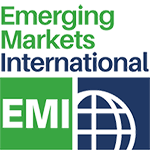Developing countries often face internal constraints that prevent them from reaping the economic benefits of expanded trade.
For instance, Trade openness can help achieving sustainable and inclusive economic development (SDG 8 – Decent work and economic growth), and consequently poverty reduction (SDG 1 – No poverty). Trade also provides countries with a key to catalyse job creation, boost incomes, increase foreign exchange earnings, and unlock socio-economic growth.
In over 20 years Emerging Markets International (EMI) succeeded in providing support to developing countries through the implementation of multi-country programmes focusing among other on the negotiation and implementation of regional, bi-multi lateral trade agreements (i.e WTO Accession, EPA, and i-EPA) trade development strategy, boost competitiveness, build value addition, develop new markets and on support to key regional value chains.
EMI aims at supporting these countries in overcoming obstacles such as cumbersome regulations, poor infrastructures and lack of appropriate skills in order to better integrate and benefit from the global rules-based trading system, by providing technical assistance, budget support, and trade capacity building activities, enhancing the ability of the regional communities, partner country policymakers, enterprises and the civil society.
EMI is a key partner for developing countries who are seeking to expand and strengthen their trade policies in a sustainable way.
Areas of intervention:
- Trade facilitation
- Negotiation and implementation of multilateral, regional and bilateral trade agreements
- Removal of market access barriers in third countries
- Technical Barrier to Trade (TBT) and Quality Infrastructure
- Sanitary and phytosanitary (SPS) measures
- Accession to WTO
- Intellectual property rights
- Investment promotion
- Public procurement
- Competition policy

